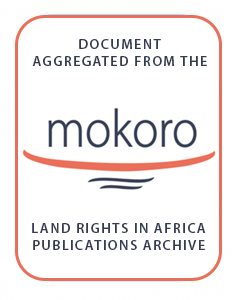Location
Mokoro is pleased to host the ’Land Rights in Africa’ site as a contribution to the land rights dialogue and related debates. This website was created in January 2000 by Robin Palmer, and was originally housed by Oxfam GB, where Robin worked as a Land Rights Adviser. A library of resources on land rights in Africa – with a particular focus on women’s land rights and on the impact of land grabbing in Africa – the portal has been well received by practitioners, researchers and policy makers, and has grown considerably over the years. Since 2012, Mokoro has been hosting and maintaining the site.
The views expressed on the Land Rights in Africa site as well as the publications hosted there, are those of the authors and do not represent those of Mokoro. Wherever possible, we link to the source website of publications.
Members:
Resources
Displaying 731 - 735 of 1134Emerging Issues for Public Consultation with Policy Options
Part of the ongoing process of developing Uganda’s Draft National Land Policy. Definition of critical policy issues, statement of the problem, possible emerging policy options. Looks at clarity and certainty of land rights, constitutional and legal frameworks, land-rights administration, land use and management, implementation issues.
Righting the Wrongs: Historical Injustices and Land Reforms in Kenya
Includes key concerns and policy recommendations.
Land and agrarian reform in the 21st century: changing realities, changing arguments?
Asks what convincing rationales exist for land reform in the 21st century and for land policies and programmes that have poverty reduction as their key objective? Argues that the economic bases of pro-poor land reform need reformulating in the rapidly changing conditions of the contemporary world. The unequal structures of international agricultural trade regimes need to be made integral to thinking about agrarian reform. Includes a table with arguments for land reform.
Literature Review of Governance and Secure Access to Land
Includes why is secure access to land important; secure property rights, economic growth and social justice; the scale of insecure access to land; political contestation; the role of donors; IIED v FIG, contrasting ways of looking at land issues; governance and corruption; recourse to legal remedies; struggling for urban survival; aid instruments; lessons and recommendations from the literature – the IIED school, FAO and EU guidelines.
Institutional Framework for Land Administration and Management in Kenya
Includes key policy concerns and recommendations.





